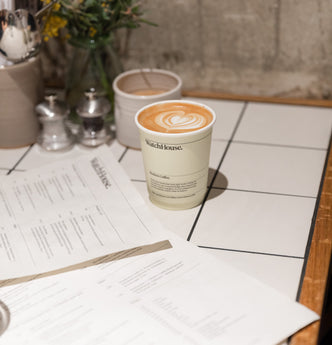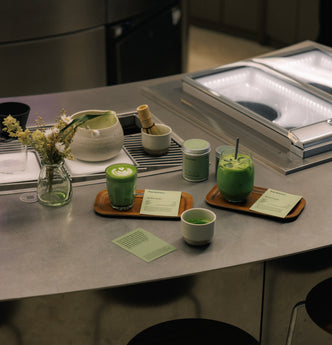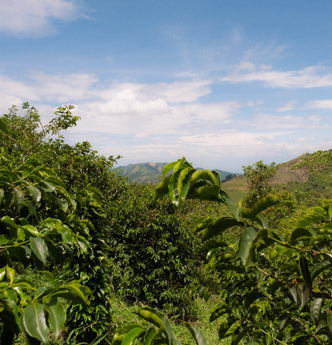Spotlight.
Single use culture.
June 03, 2020
Written by WatchHouse .



Brodie Roberts | Head Barista Spitalfields
“We don’t need a handful of people doing zero waste perfectly. We need millions of people doing it imperfectly.” - Anne Marie Bonneau, Zero Waste Chef.
‘Every minute, one garbage truck of plastic is dumped into our oceans!’ - World Economic Forum
Sustainability is not a choice; it is a necessity. On a global scale, we are nowhere near being zero waste or living without plastic. However, living in the United Kingdom today, we will almost always have a choice as to whether to use and purchase plastic. Sustainability is a broad topic that can seem somewhat overwhelming. If you’re unfamiliar with the topic in the coffee industry, we recommend reading our spotlight ‘People, Planet and Profit’.
There are three key pillars when approaching sustainability in the coffee industry: economic, environmental, and social.
Economic sustainability is perhaps the most obvious pillar. A business needs to be able to make a profit to stay afloat. However, when pursuing any initiative in areas of social or environmental change, this can sometimes fall by the wayside.
Environmental sustainability refers to being able to minimize (or if possible, eliminate) the footprint of your business on the environment. This is paramount to sustaining a business long-term, ensuring that coffee for future generations can grow and flourish.
Social sustainability is perhaps the least obvious pillar. It refers to being able to maintain healthy and liveable communities. Attempting to achieve social sustainability requires thought of both your immediate social environment, as well as the broader impact you and your business have on worldwide society.
Every year, on June 8th, we are given the opportunity to raise global awareness of the benefits humankind derives from the ocean and our individual and collective duty to use its resources with sustainable practices. Future generations will also depend on the ocean for their livelihoods. Plastics are harming marine life. Carbon pollution is warming the oceans and increasing their acidity. Waters are being overfished. One study found that tossed plastic trash could outweigh fish by 2050. Plastic Oceans UK tells us there is an estimated 5 trillion pieces of floating plastic, many of which are found in ocean gyres referred to as garbage patches. 1 of the 5 major gyres in the world, Great Pacific Garbage Patch is 1.6 million k㎡ - that is 3 times the size of France.
Zero or low waste lifestyles can often seem unattainable. The attempt to reduce our CO2 footprint and contribution to landfill sites, recycle, and lower food waste is something we should all incorporate into our day to day lives. So many things in life are there purely for convenience and ease. How uneasy is life without these? Let’s say you need to rinse your reusable coffee cup before going out for the day, or you need to remember to take bags with you. Not that difficult. Plastics that are recycled can only be recycled once or twice before ending up in a landfill, after which they can take centuries to breakdown. It’s in our water system, eaten by wildlife and choking rivers around the globe.
So, what about biodegradable? In theory, great, however, in practice, not so much. Everything breaks down eventually, some things in weeks and others, millennia. This does not solve the real issue. Items break down into smaller parts and can be ingested, only passing issues up the food chain and resulting in microplastics.
So, what about compostable? Studies have shown that compostable products can completely break down in a marine environment in 3 months and 28 months in soil. Although this may seem like a positive thing, such products should biodegrade in a managed composting process through the action of naturally occurring microorganisms, a waste stream the UK does not have.
London recorded the lowest home recycling rates in the UK at 33.4%, in 2019. While the capital’s higher population density is an issue, much of the blame has been focused on a “confusing” patchwork of capabilities across the city’s 32 boroughs, each responsible for their own recycling. Currently, no single site is able to process the same items creating chaos in the system. Food waste that is thrown away does not break down as harmlessly as you might think. If food waste ends up in landfill, it rots and releases methane, a greenhouse gas that is 25 times more potent than carbon dioxide - meaning bad for the environment. Does your borough collect food waste?
Watch House has teamed up with Decent Packing, using compostable packaging to help our planet. We have introduced, across all Watch House shops, their take-away cups and lids that are completely commercially compostable. Decent began their mission in New Zealand in 2013, wanting to create an alternative for packaging solely from plant-based materials and, with that, lower energy consumption, water consumption, and polluting emissions. By using plant sugars, Poly Lactic Acid (PLA) and its heat tolerant cousin CPLA, the molecules are derived from corn instead of fossil fuels.
We can all make active changes in our day-to-day lives to have a positive impact on the environment. Sustainability is not mainstream or niche. Don’t be afraid to talk about single use take-away cups and the rubbish on the street. We must encourage conversation on uncomfortable topics in order to see change.


